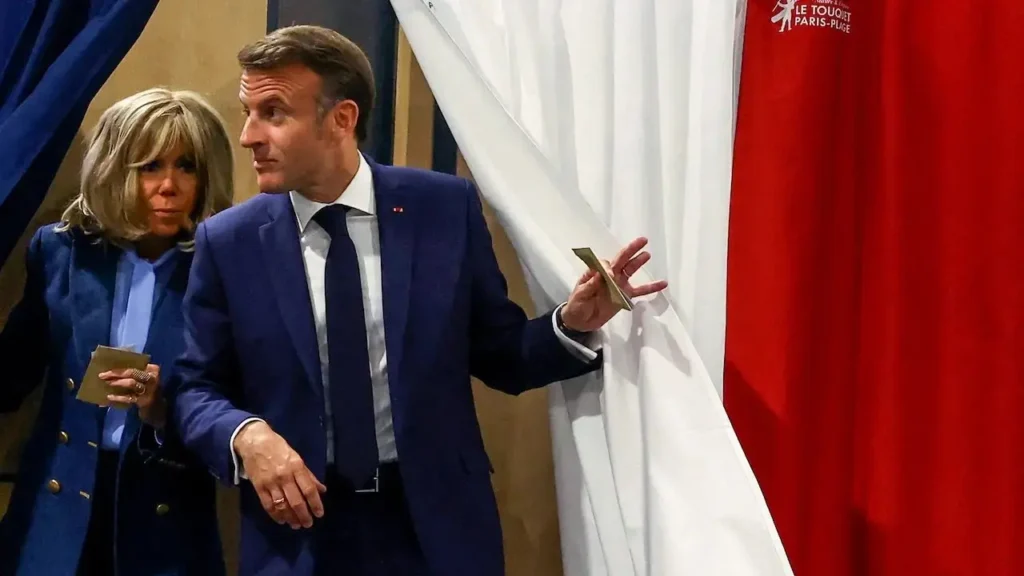
Macron Calls for Snap Election Amid EU Election Setback

In a dramatic political development, President Emmanuel Macron has called for a snap election following significant losses in the recent European Union (EU) elections. This move aims to address rising dissatisfaction among French voters and attempt to restore political stability in a divided nation.
Major Losses for Macron’s Party
Macron’s political party, La République En Marche! (LREM), suffered a major setback, securing only 14% of the vote in the EU elections. This result represents a sharp decline from previous years, highlighting a shift in voter sentiment. In contrast, Marine Le Pen’s National Rally surged ahead with 25% of the vote, signaling a growing preference for nationalist and Eurosceptic platforms among the French electorate.
The losses have been interpreted as a response to Macron’s centrist policies, which some critics argue have failed to adequately address economic disparities and immigration concerns.
Public Reaction and Political Climate
The election results have ignited debates across France. Supporters of the National Rally see this as a clear mandate for change, celebrating a move towards stronger national sovereignty. Conversely, Macron’s supporters worry about the rise of far-right ideologies and its potential impact on France’s position within the EU.
Political analysts view Macron’s decision to call a snap election as a high-stakes strategy. It could provide an opportunity to reset his political agenda and appeal to a divided electorate, but it also risks further fragmentation if no party secures a clear majority.
Macron’s Statement: A Call for Unity and Renewal
In a televised address, Macron acknowledged the dissatisfaction reflected in the EU election results. He emphasized a renewed commitment to listening to the concerns of all French citizens.
“The EU election results have made it clear that many feel unheard and dissatisfied. We must take this moment to reconnect with the people and face our challenges together,” Macron declared.
Macron also expressed concerns over the rise of nationalist sentiments, viewing them as a potential threat to both France and the stability of Europe. He called for unity to counteract what he described as divisive ideologies.
Reactions from Political Opponents
The announcement of a snap election was met with enthusiasm from Macron’s political rivals. Marine Le Pen, buoyed by her party’s recent success, voiced optimism about the future.
“The French people have called for change, and we are prepared to lead France into a new era focused on national interests and sovereignty,” said Le Pen.
Jean-Luc Mélenchon, leader of the left-wing France Insoumise, also welcomed the election, seeing it as a chance to challenge Macron’s centrist policies.
“This is a moment to present a genuine alternative to the neoliberal agenda,” Mélenchon stated, signaling a potential shift towards more progressive economic policies.
International Implications of the Snap Election
The decision to hold a snap election has drawn attention across Europe and beyond. As a key member of the EU, France’s political stability is closely tied to the broader dynamics of the union. The election outcome could influence EU policies on critical issues like immigration, economic integration, and defense cooperation.
European leaders are observing the situation carefully, aware that the French electorate’s decision could have wide-reaching effects on EU unity and future policymaking.
What’s at Stake for France
As France heads into this unexpected election period, the stakes could not be higher. The country faces a range of challenges, including economic reform, social integration, and maintaining its pivotal role in European affairs. Campaigns are expected to be fierce, with each party striving to win over an electorate that is increasingly skeptical of traditional politics.
The results of this election will not only determine the leadership of France but will also have lasting implications for its domestic and international policies. France is at a crossroads, with the choice between nationalist leanings and a continued commitment to a unified Europe hanging in the balance.
A Nation at a Crossroads
France’s upcoming election represents a defining moment in its political history. The decision to call a snap election is an acknowledgment of the complexities and challenges of modern governance in an era of heightened political polarization. The world watches closely, anticipating the outcome and its impact on the European stage.



